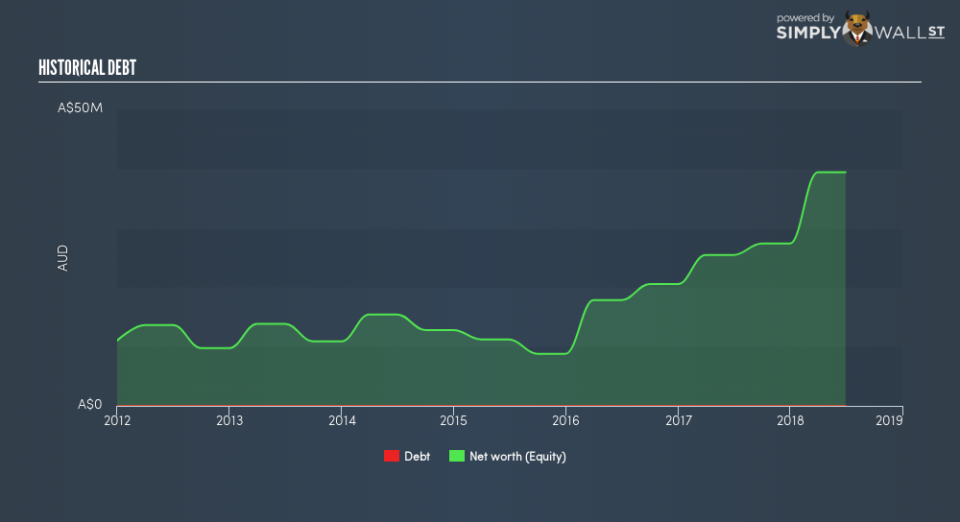Is Clinuvel Pharmaceuticals Limited’s (ASX:CUV) Balance Sheet A Threat To Its Future?

The direct benefit for Clinuvel Pharmaceuticals Limited (ASX:CUV), which sports a zero-debt capital structure, to include debt in its capital structure is the reduced cost of capital. However, the trade-off is CUV will have to adhere to stricter debt covenants and have less financial flexibility. Zero-debt can alleviate some risk associated with the company meeting debt obligations, but this doesn’t automatically mean CUV has outstanding financial strength. I recommend you look at the following hurdles to assess CUV’s financial health.
View our latest analysis for Clinuvel Pharmaceuticals
Does CUV’s growth rate justify its decision for financial flexibility over lower cost of capital?
Debt funding can be cheaper than issuing new equity due to lower interest cost on debt. However, the trade-off is debtholders’ higher claim on company assets in the event of liquidation and stringent obligations around capital management. CUV’s absence of debt on its balance sheet may be due to lack of access to cheaper capital, or it may simply believe low cost is not worth sacrificing financial flexibility. However, choosing flexibility over capital returns is logical only if it’s a high-growth company. CUV delivered a strikingly high revenue growth of 52% over the past year. Therefore, the company’s decision to choose financial flexibility is justified as it may need headroom to borrow in the future to sustain high growth.
Can CUV meet its short-term obligations with the cash in hand?
Since Clinuvel Pharmaceuticals doesn’t have any debt on its balance sheet, it doesn’t have any solvency issues, which is a term used to describe the company’s ability to meet its long-term obligations. But another important aspect of financial health is liquidity: the company’s ability to meet short-term obligations, including payments to suppliers and employees. Looking at CUV’s AU$3.5m in current liabilities, it appears that the company has maintained a safe level of current assets to meet its obligations, with the current ratio last standing at 12.18x. Having said that, a ratio greater than 3x may be considered by some to be quite high, however this is not necessarily a negative for the company.
Next Steps:
Having no debt on the books means CUV has more financial freedom to keep growing at its current fast rate. This may mean this is an optimal capital structure for the business, given that it is also meeting its short-term commitment. Moving forward, its financial position may change. I admit this is a fairly basic analysis for CUV’s financial health. Other important fundamentals need to be considered alongside. I recommend you continue to research Clinuvel Pharmaceuticals to get a better picture of the stock by looking at:
Future Outlook: What are well-informed industry analysts predicting for CUV’s future growth? Take a look at our free research report of analyst consensus for CUV’s outlook.
Valuation: What is CUV worth today? Is the stock undervalued, even when its growth outlook is factored into its intrinsic value? The intrinsic value infographic in our free research report helps visualize whether CUV is currently mispriced by the market.
Other High-Performing Stocks: Are there other stocks that provide better prospects with proven track records? Explore our free list of these great stocks here.
To help readers see past the short term volatility of the financial market, we aim to bring you a long-term focused research analysis purely driven by fundamental data. Note that our analysis does not factor in the latest price-sensitive company announcements.
The author is an independent contributor and at the time of publication had no position in the stocks mentioned. For errors that warrant correction please contact the editor at editorial-team@simplywallst.com.

 Yahoo Finance
Yahoo Finance 
